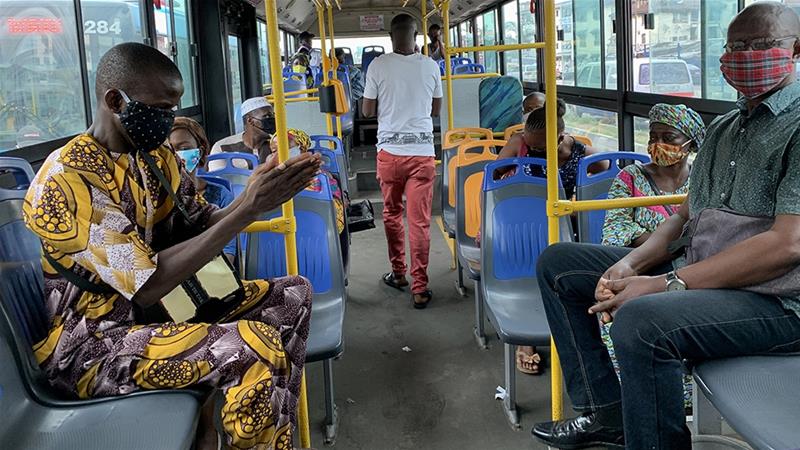Fidelis Mbah
Commercial activities resumed on Monday in Nigeria’s capital, Abuja, and Lagos and Ogun states after the government announced the gradual easing of restrictions to curb the spread of the coronavirus pandemic.
President Muhammadu Buhari last Monday “approved a phased and gradual easing of lockdown measures”.
“I feel so happy returning to work after sitting at home for more than a month,” said Ajaero Hezekiah, who runs a gift shop in the commercial capital, Lagos.
The 53-year-old father of four returned to his place of business after closing his shop on March 30 to comply with a government directive to stay away from public spaces in three key states.
“I was close to losing my mind at home because of the financial pressure from family. I ran out of money, we were gradually running out of food, too, and I wasn’t earning any income to pay bills,” Hezekiah told Al Jazeera.
“I know the lockdown is for our own safety, but I and my family needed to eat to survive. It was tough.”
Open for business
For the first time in 35 days, shop owners Lagos like Hezekiah reopened under “strict measures” to mitigate the spread of the virus.
The Lagos state government said markets for non-food items will be allowed to open on Mondays, Wednesdays and Fridays. Food stores will be open for business on Tuesdays, Thursdays and Saturdays. The shops, offices and markets will only be open between 9am and 3pm.
The government is enforcing the wearing of face masks in public places, shops and on public transport. Only the movement of food items and the travel of essential workers were permitted during the lockdown.
Travel between regions will, however, not be permitted despite the easing of the restrictions.
Schools, bars and cinemas remain shut, while only senior government managers in Lagos are expected to return to work on Tuesday. Others will be advised when to resume their duties.
“All places of worship are to remain closed to congregational services until further notice. This prohibition applies also to religious gatherings that may be conducted in homes, such as communal Tarawih prayers, or house fellowships,” Lagos Governor Babajide Sanwo-Olu told journalists on Sunday.
More infections
In recent weeks, the country has witnessed a spike in the number of confirmed coronavirus cases.
Nigeria, Africa’s most populous country with some 200 million people, has recorded 2,558 cases of coronavirus and 87 deaths.
The country confirmed its first COVID-19 case on February 27, and there were 131 recorded cases when the federal government announced a lockdown on March 30.
Many residents were seen at banks in Lagos trying to conclude transactions while others engaged in different commercial activities.
Some residents handled the gradual lifting of the lockdown with caution.
Lagos, with a population of about 20 million people, has 1,107 confirmed cases and 30 deaths.
“I don’t support the lifting of the lockdown, especially for Lagos, which is the epicentre of the virus in the country. How do you control the millions of people? It will be so difficult to enforce the rules,” said Sadiat Badmus, who runs a shoe store in Yaba market.
“I understand we all need money, but my life and that of my family is more precious to me. I will remain at home for a few more days before considering reopening my shop,” the mother of two told Al Jazeera.
Shops selling non-food items remained shut in Abuja, and most government offices were not open for business.
Restrictions on interstate travel have made it difficult for some business owners who commute between the capital and neighbouring states.
“I will continue my transactions from home until the number of confirmed cases comes down. I don’t want to take so much risk by going out to the shop,” said Umar Abdullahi, who runs a forex exchange business in Abuja.
Not enough beds
Nigeria’s healthcare workers ramped up testing but struggled to accommodate patients in isolation centres where they are being attended to.
“The biggest challenge right now is in Lagos, where bed spaces are really tight,” the director-general of Nigeria Centre for Disease Control (NCDC), Dr Chikwe Ihekweazu, told journalists on Thursday.
“Across the country we have about 3,500 bed spaces identified available for COVID-19,” Ihekweazu said, adding that authorities are working with state governments to ensure more patients are accommodated for treatment.
The NCDC has also come under immense pressure in Kano, the country’s most populous state, after officials said they were investigating a series of “mysterious deaths”.
Dozens of people have been reported dead with no official confirmation of the death toll.
The government in the northern state has denied the deaths were related to coronavirus, saying preliminary investigations revealed they were caused by complications from hypertension, diabetes, meningitis and acute malaria.
Anietie Ewang, a Human Rights Watch Nigeria researcher, called on health authorities to act swiftly to prevent an outbreak.
“Recent reports of hundreds more deaths than usual across communities in Nigeria’s Kano state have raised fears that a major COVID-19 outbreak is under way,” Ewang said in a statement on Monday.
“Access to testing has so far been limited. Amid reports of the rising death toll, Kano’s only testing centre was shut down on April 22 for five days due to fears of contamination,” she added.
A federal government committee is investigating the cause of the deaths.
(SOURCE: AL JAZEERA NEWS)

